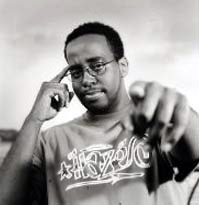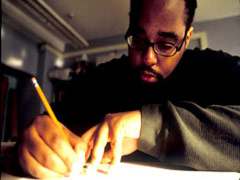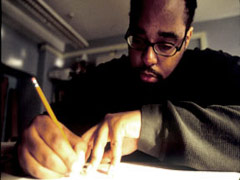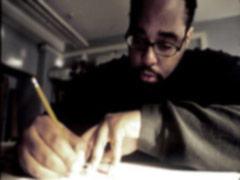The Interview: J-Live
- Lyrical Wordsmith
- Representing BK
- Place of Residence: Brooklyn, NY
- Current Project: “All of the Above”
Making a choice is a proverbial dart game - you aim, you shoot, and you hope that your experience in the game and flawless aim will help you hit the target. Regardless, even the most skillfully thrown dart can miss it’s mark - and any choice you make can end up producing results that you weren’t expecting. J-Live has chosen to live for Hip Hop, weaving the culture in and out of what some might consider a rather conservative lifestyle. Deejaying, writing rhymes, freestyle battling, recording and performing were a part of his world from the age of 12, and he always envisioned a niche for himself in music.
While he was attending college at S.U.N.Y. Albany, J-Live was in the studio putting his heart into his future plans. In 1995 he took up an internship with Raw Shack Records, and released “Longevity” and “Braggin’ Writes”. He was written up as Unsigned Hype in the Source, was getting a respectable amount of underground radio play, and the single went on to sell 13,000 copies on wax. In 1996 he followed up with another single, “Can I Get It” backed with “Hush The Crowd”, but his relationship with Raw Shack was not echoing the success he was feeling in the streets. In 1997 he signed with Payday Records, a label that already had signed (and lost) a solid roster of artists including Jay-Z, Showbiz & AG, and Mos Def’s group Urban Thermo Dynamics (UTD).
He recorded the album The Best Part, but just as J-Live was beginning to feel like he was sailing smoothly, he began to realize why the other groups on his label had jumped ship. By 1998 his own relationship with Payday Records dissolved, and he chose to move on to yet another label contract with Universal Records. In 1999 he re-recorded The Best Part, and worked with Prince Paul and Dan The Automator on their Handsome Boy Modeling School project. Although his work on So…How’s Your Girl? brought him even closer to achieving staying power, his own contract with Universal was short-lived.
They say the third time is a charm, and J-Live made the decision to give The Best Part another shot. He dedicated his energies and started Triple Threat Productions, and in February 2002 he finally released The Best Part . The first-hand lessons in bad business graced J-Live with the patience and insight to persevere. “Basically what I’ve learned is that the artist has himself and that’s it,” he says. “A manager will have several artists, a producer will have several artists they’re working with, a label will have several artists they’re working with, but an artist really only has himself. If I don’t put everything I have into my career and I flop, then everyone else keeps it movin’ while I’m pretty much assed out. That being said, I’m trying to put myself in a position now where I have more control over what goes on in the business side of my art - and slowly but surely that’s coming to pass.”
Even through his trials and tribulations, J-Live does not feel as though his career has missed the train.“I make the kind of music that stands the test of time, that people can appreciate four or five years later - that’s why I was able to still do tours and shows year round without having an official release out. That’s why The Best Part was bootlegged to the point that everybody heard it but nobody knew how to get it. It’s really just a matter of putting the right machinery involved in terms of business, and putting the right vessels out to get my music to the people on a regular basis, but I’ve established myself as far as my reputation.”
So new jacks feel the sad truth, the proof/Now you can have the best beat and the illest flow/ A dope crew with the fool proof stage show/ But its your jams that the followers don’t know/ You ain’t gettin’ no love from the crowd bro - J-Live “Hush The Crowd” 
J-Live received kudos from the underground fans for his assertive lyrics on “Hush The Crowd”, but does not feel that he was pigeonholed into underground stagnancy at any point. “When I did ‘Hush The Crowd’ back in 1996, it was because as an opening act, I was talking about the plight of the opening artist. Like when I opened for the Fugees it was cool because the only reason I got to do the show was because I went to school there - I had just come out at the time - and what was phat was that all of my peoples were at the show. But the funny thing about it was that we had to get on so early, there was still a line outside - people hadn’t even gotten in yet. It’s that kinda thing that up and coming artists go through. Back then, when I was an up and coming artist, it was cool to do a song about it - but now on the other side of things, now that I’m headlining shows and seeing other acts come before me, I make sure that I’m there and I get to see who’s opening and that I give them props - and if there’s time at the end of the show I bring the first act back on stage to freestyle.”
With a solid amount of self-knowledge on his side, J-Live takes a healthy approach to the ‘mainstream versus underground’ debate. “The only reason the music is classified as underground is because it’s not thrown in people’s faces ten times a day- you have to literally dig it up if you want to know about it. Other than that it’s really just about dope Hip Hop and wack Hip Hop. As my music becomes more successful and gets more opportunities to be played in the major markets, it’s really just gonna be an opportunity for more people to get with what I’ve been doing. It’s not such that I’ve changed my style of music, it’s not such that people have ‘decided’ to like me - it’s just that they didn’t get a chance to hear me before. So, it’s really just a growth process with every artist in every genre of music has to go through, but it just so happens that in Hip Hop right now there’s a serious lack of contrast with the kind of stuff that gets played.”
Like many emcees in the industry today, J-Live feels that his college experience helps to strengthen his skills in the music business. With a Bachelor’s degree in English, he feels that grasping formal studies and gripping a microphone can compliment each other. “[Emcees] might not have gotten their emcee job with their degree, but I definitely see the benefits of studying English when it comes to being a writer. It’s a natural ‘couldn’t help but happen’ kinda thing, where I had access to that much more literature, had access to teachers that helped me with my creative style, just opened my eyes to a bunch of different things that I apply to my music just like everything else in life. The amount of education a person has, whether they be self-taught or whether they went to an institution, it’s gonna reflect in their music regardless.
“I would say to anybody who wants to get into this business, it is a business and schools have classes on business for a reason. I remember when we put out ‘Longevity’ in between singles before ‘Can I Get It’ dropped, when I was starting to have trouble with Raw Shack, applying the same principles that were in my accounting textbooks and economic textbooks, and studying for them on a plane to Japan to do shows, but thinking to myself ‘I’m learning this stuff first hand right now’. So, for anybody - a lot of people say college isn’t for everybody - I would say that nobody should count themselves out of the opportunity off the bat before they had a chance to try it. It’s pretty much a whole ‘nother world.”
For all his challenges, J-Live maintains a positive attitude. “I can’t complain. For the way that things are going for me right now, I go to a show - like last month we did a show in Brighton in England, and six months ago we went to Brighton, the same venue - and six months ago the place was about half packed, and last month the place had a line outside at midnight when things were already packed up tight in the venue. It shows that the last time I was out there people recognized, whether it was ‘Bragging Writes’ seeing me rhyme and cut at the same time, or whether it was ‘Them That’s Not’, or whether it was The Best Part, the Premier song that everybody likes - they have things to come back and see. They were impressed by the first show and we sold out the second show. That’s like a microcosm of my career. People who know me, although they may be few right now, they go out and they tell people - and little by little word of mouth, slowly but surely, my career’s taking me to the point where I’m sitting here doing this interview now. In terms of familiarity, The Best Part was a record that was recorded in ‘99 and people are just now getting the opportunity to hear it. Had I given up in 2000, I’d be missing out on all this good stuff that’s going on right now.”
While J-Live was steadily pushing to release The Best Part and busily touring, he was quietly recording yet another album. His resourceful approach to building a foundation for himself is coming full circle. “Throughout all this time while we’ve been waiting to put out The Best Part , the different advances I’ve gotten from different labels I’ve invested right back into a studio - from watching people like Premier, Prince Paul, Spinna, Pete Rock - especially Spinna - from watching all these producers in the studio, not just showing up to drop my vocals and bouncing - just catching all the little tricks of the trade, I’ve become pretty skilled at that trade now too. It’s multiplied the things I can do now in music.”
His newest venture is entitled All Of The Above. “It’s a pretty big album for my career,” he says with a smile. “A lot of people say that it sounds better than The Best Part which is considered kind of a bootleg classic - so I hope that I get the same kind of response with this one. The fact that this will be the first time I put a video out to the public, the first time we really go after commercial hits on radio by the end of the year - hopefully… all I can really ask for is that people get a chance to hear my music. I suspect that it’s gonna be the kind of scenario like they talk about with people who’ve been stuck with the water with the dye in it - the minute they get a chance to buy some clear water they jump all over it. There are very, very few people that have heard me haven’t really been responsive. Just the fact that more people will get a chance to hear me right now gives me good feelings about what’s gonna happen this year.
“It shows a lot of growth between the last one, because The Best Part was an album that had a so many different producers on it that the challenge and the mission was to develop a sound that was recurring or consistent throughout that project - and I think I achieved that, a lot of people say it doesn’t sound like a compilation even though there’s so many producers on it. With this album, me being able to produce myself - growing in that sense - you know more about what you want than any other producer could do for you, it’s just whether or not you can deliver and execute it. This album is pretty much just me, DJ Spinna and Usef Dinero - but it’s still feels little bit more homey, each song goes with each song a little bit better. And then to bring in a Jazzy Jeff record - it [was] just that icing on the cake - it was an honor to work with him, but more importantly, it was good to bring something that the album lacked. That was the last song that we did - it was like ‘what’s missing?’ and he filled that piece in just right.”
While other emcees may be playing a hit and miss game in pursuit of an often elusive target, J-Live has been sharpening his wit and aiming his skills in a direction that will bring him closer to the bullseye of ultimate success.
By Dove
~Sheepish Lordess of Chaos~
Courtesy of Elemental Magazine elementalmag.com
————————
Whudat.com - June 2002


